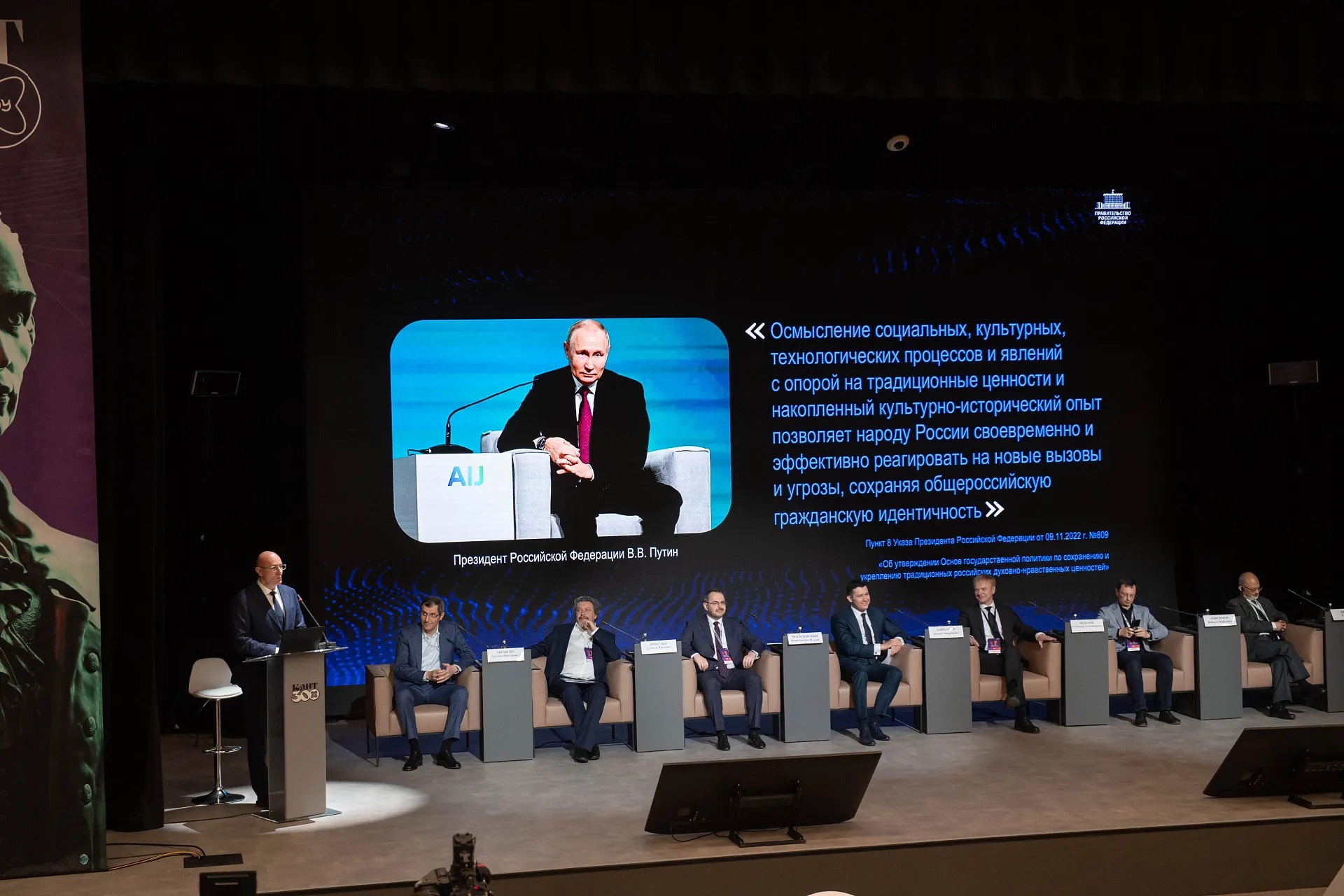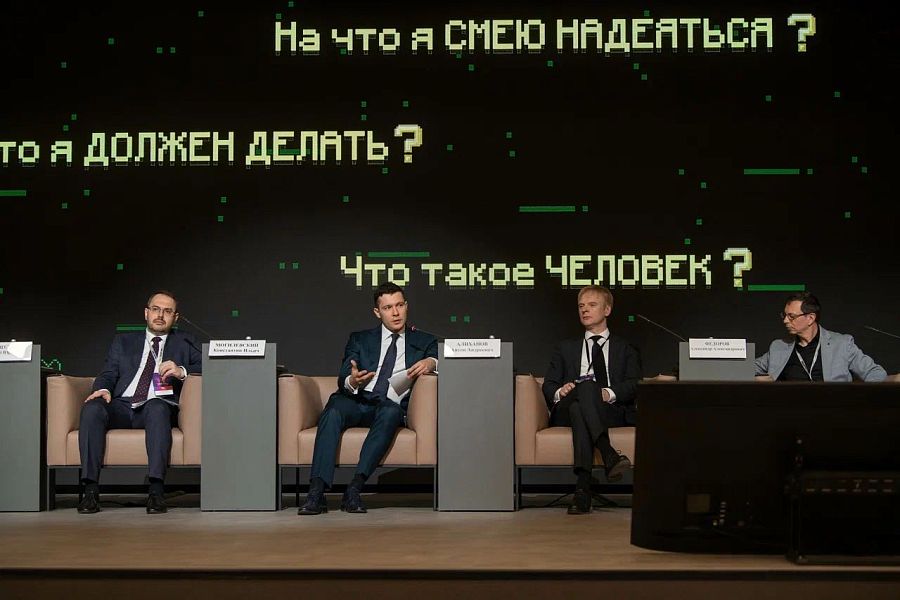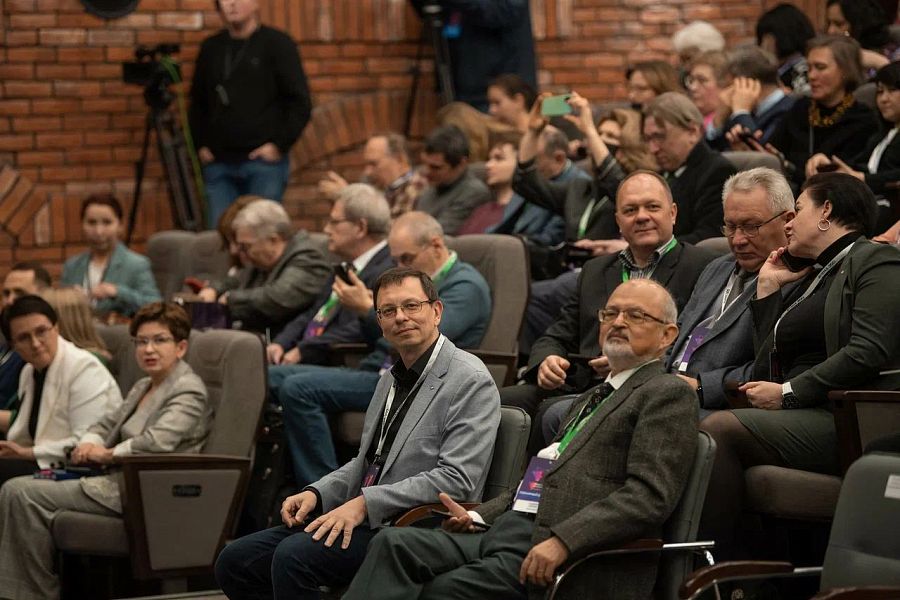Artificial Intelligence Tested by Kant Philosophy
.jpg)
The Baltic Federal University (Kaliningrad) recently hosted an International Congress entitled ‘The World Concept of Philosophy’ in honour of the 300th anniversary of the birth of the philosopher and thinker Immanuel Kant. The event brought together about 500 scientists and experts from 23 countries. HSE Rector Nikita Anisimov took part in the opening plenary session of the congress titled ‘Critique of Artificial Intelligence: Being and Cognition in the Context of Artificial Intelligence Development.’
Opening the congress, Deputy Prime Minister Dmitry Chernyshenko read a welcome message from Russian President Vladimir Putin. The head of state emphasised that the initiative to widely celebrate the anniversary date received active support both in Russia and abroad. ‘I hope that the anniversary celebrations will be instrumental in preserving Immanuel Kant’s rich intellectual and humanistic legacy and encourage the further study of his works, which became a veritable breakthrough in their time.’

Dmitry Chernyshenko emphasised that the widespread use of AI is a new stage in the development of humanity, which opens up great prospects for economic progress but requires a considered and responsible approach. According to expert forecasts, the total contribution of AI technologies to the global economy could reach $15 trillion by 2030.
The Deputy Prime Minister noted that Russia has developed a national strategy for the development of artificial intelligence, which includes 8 key tasks and 10 indicators, the main one being the growth of Russia’s GDP by 11.2 trillion roubles. Experimental legal regimes have become an effective mechanism for the development, implementation, and use of AI. Currently, 13 such regimes have been approved in the field of unmanned aviation systems and unmanned transport, as well as in healthcare.

An important ethical regulator of technological progress is our culture, the Deputy Prime Minister said. Traditional values are moral guidelines that shape the worldview of Russian citizens.
‘High moral ideals, humanism, justice, respect for the individual, and cultural values of our multinational and multi-confessional country should form the basis for our domestic developments,’ concluded Dmitry Chernyshenko.
The Governor of the Kaliningrad Region, Anton Alikhanov, noted that the greatest legacy of the philosopher is substantive dialogue. He believes that a philosopher is valuable not only for answering important questions but also for posing new problems. Currently, as the governor believes, it is necessary to understand what AI is, what it can know, do, and what it should do.
Russian Deputy Minister of Science and Higher Education Konstantin Mogilevsky believes that higher education should evolve, anticipating forthcoming changes in the world, to ensure its future. Artificial intelligence has become an integral part of the educational process and university management in recent years. ‘Last year, the Ministry of Science and Higher Education of Russia, together with our leading universities and technology companies, created a special competency model in the field of AI. It included a detailed description of professions related to artificial intelligence technologies: researcher, analyst, data architect, and so on. Subsequently, this formed the basis for the professional-public accreditation of educational programmes in the field of AI, conducted by the Alliance for Artificial Intelligence. And already, more than 6,000 people enrol in AI-related programs every year,’ Konstantin Mogilevsky said.

The Rector of the Immanuel Kant Baltic Federal University Alexander Fedorov noted that philosophy is not an exclusive occupation; everyone engages in it by comprehending reality and their place in it. In his opinion, AI has become both a process and a reality. ‘A very important question is whether a situation will arise where we can say that generative artificial intelligence has its own interest? Then we will begin to endow it with the same characteristics that we have. It is quite possible that the entire arsenal of cognitive-anthropological terminology, which we are used to applying to ourselves, cannot be applied to artificial intelligence. We just don't know how to really talk to it yet,’ he noted. Restrictions are necessary in the development of new technology so that it develops in conjunction with humanity, not separately from it, Alexander Fedorov believes.
People often attribute anthropomorphism to AI, calling the software product ‘intelligent’ and demanding results from it similar to those from the human brain, but AI should not be considered as intelligence in the full sense of the term, believes HSE Rector Nikita Anisimov. In his speech, he pointed out that the effectiveness of AI technologies is high in solving a large number of tasks, including educational ones.

‘We have decided to integrate AI usage technologies into all university educational programmes in their professional field. And in the preparation, for example, of historians and philosophers, technologies for using artificial intelligence in professional activities will be embedded in educational programmes from next year. In addition, we have 19 targeted training programmes in artificial intelligence. These are programmes designed for both students of IT specialties and for training students with a strong IT core, focusing on new tasks in biotechnology, fintech, development, geoinformation technologies, and other areas of the digital economy,’ Nikita Anisimov said.
The quality of education in the IT and AI field has been proven, particularly by the success of HSE University at the recent International Collegiate Programming Contest (ICPC), where one HSE team became world champions and another team took third place. The HSE Rector also mentioned that HSE University has launched a competition for solutions using artificial intelligence technologies in thesis writing. The goal of the competition is to evaluate students' use of tools based on generative models in graduation theses defended in 2024.
The plenary session of the International Kant Congress also involved Sunjoy Joshi, Chairman of the Observer Research Foundation (ORF, India), Arutyun Avetisyan, Director of the Ivannikov Institute for System Programming of the Russian Academy of Sciences, and Alexey Pishchulin, Director of the Federal Centre for Humanities Practices at the Russian State University for the Humanities.
The International Kant Congress took place in Kaliningrad from April 22nd to April 25th, 2024. It was organised by the Russian Ministry of Science and Higher Education and the Government of the Kaliningrad Region, and held at the Immanuel Kant Baltic Federal University.
See also:
Megascience, AI, and Supercomputers: HSE Expands Cooperation with JINR
Experts in computer technology from HSE University and the Joint Institute for Nuclear Research (JINR) discussed collaboration and joint projects at a meeting held at the Meshcheryakov Laboratory of Information Technologies (MLIT). HSE University was represented by Lev Shchur, Head of the Laboratory for Computational Physics at the HSE Tikhonov Moscow Institute of Electronics and Mathematics (HSE MIEM), as well as Denis Derkach and Fedor Ratnikov from the Laboratory of Methods for Big Data Analysis at the HSE Faculty of Computer Science.
AI vs AI: Scientists Develop Neural Networks to Detect Generated Text Insertions
A research team, including Alexander Shirnin from HSE University, has developed two models designed to detect AI-generated insertions in scientific texts. The AIpom system integrates two types of models: a decoder and an encoder. The Papilusion system is designed to detect modifications through synonyms and summarisation by neural networks, using one type of models: encoders. In the future, these models will assist in verifying the originality and credibility of scientific publications. Articles describing the Papilusion and AIpom systems have been published in the ACL Anthology Digital Archive.
HSE Researchers Develop Python Library for Analysing Eye Movements
A research team at HSE University has developed EyeFeatures, a Python library for analysing and modelling eye movement data. This tool is designed to simplify the work of scientists and developers by enabling them to efficiently process complex data and create predictive models.
‘Many Want to Create AI-Based Products and Become More Competitive’
In 2024, the online Russian-taught master’s programme ‘Artificial Intelligence,’ offered by the HSE Faculty of Computer Science, saw a record number of first-year students—over 300. What accounts for such a high interest in AI, how the curriculum is structured, and what new skills will graduates acquire? Elena Kantonistova, the programme’s academic director, shares more.
HSE and University of Campinas Celebrate World Logic Day Together
On January 15, 2025, the Russian-Brazilian Colloquium on Logical Pluralism was held at the HSE International Laboratory for Logic, Linguistics and Formal Philosophy to mark World Logic Day. This event was part of the joint project ‘Pluralistic Perspectives on Logic and Formal Philosophy,’ implemented by the laboratory and the Centre for Logic, Epistemology and the History of Science at the University of Campinas (Brazil) under the International Academic Cooperation competition.
'I Would Like to Leave a Lasting Impact on Science'
Aibek Alanov pursues his own scientific research and leads two teams of scientists, one at HSE University and the other at AIRI. In this interview for the HSE Young Scientists project, he explores the parallels between today's AI researchers and early 20th-century physicists, discusses generative models, and shares his passion for bachata partner dancing.
HSE’S Achievements in AI Presented at AIJ
The AI Journey international conference hosted a session led by Deputy Prime Minister Dmitry Chernyshenko highlighting the achievements of Russian research centres in artificial intelligence. Alexey Masyutin, Head of the HSE AI Research Centre, showcased the centre’s key developments.
Drivers of Progress and Sources of Revenue: The Role of Universities in Technology Transfer
In the modern world, the effective transfer of socio-economic and humanities-based knowledge to the real economy and public administration is essential. Universities play a decisive role in this process. They have the capability to unite diverse teams and, in partnership with the state and businesses, develop and enhance advanced technologies.
AI on Guard of Ecology: Students from Russia and Belarus Propose New Solutions to Environmental Problems
An international online hackathon dedicated to solving environmental problems was held at HSE University in Nizhny Novgorod. Students employed artificial intelligence and computer vision to develop innovative solutions for image segmentation, predictive modelling (forecasting future events based on data from the past) of emissions and creating chatbots for nature reserves and national parks.
Taming the Element: How AI Is Integrating into the Educational Process Around the World
Artificial intelligence is gradually becoming an indispensable part of higher education. Both students and teachers use it to reduce the volume of routine tasks and expand their capabilities. The limitations and prospects of AI are discussed in the report ‘The Beginning of the End or a New Era? The Effects of Generative Artificial Intelligence (GAI) in Higher Education,’ published in the journal Modern Education Analytics, under the scientific supervision of HSE Academic Supervisor Yaroslav Kuzminov.


